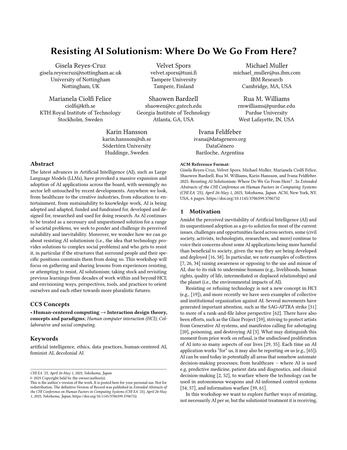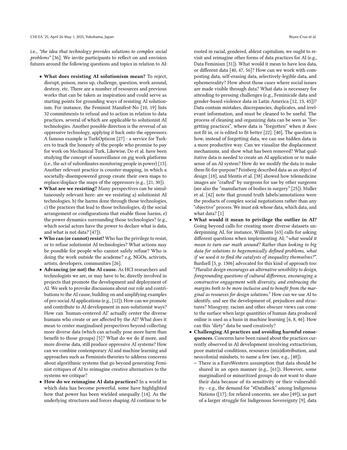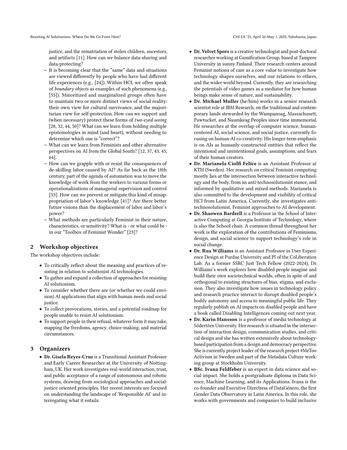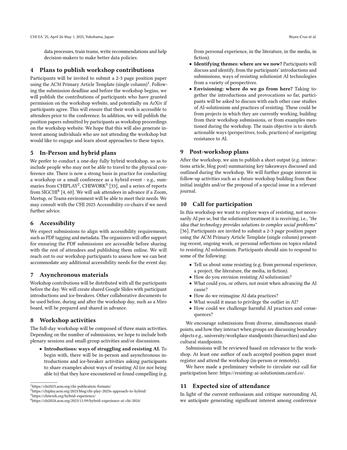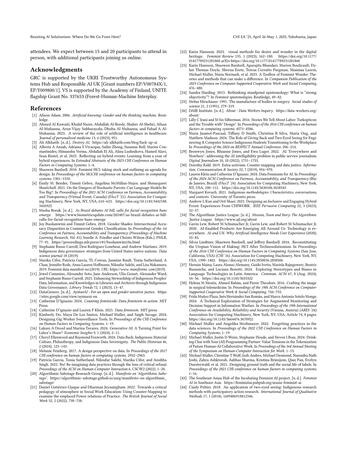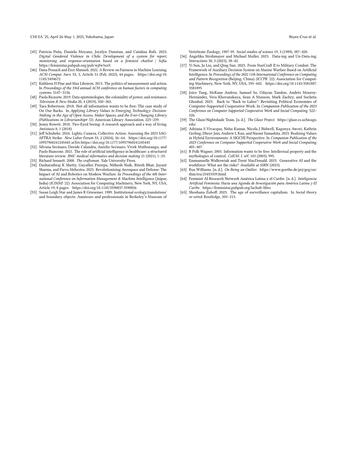Resisting AI Solutionism: Where do we go from here?
A CHI 2025 Workshop
What is this workshop about?
The latest advances in Artificial Intelligence (AI), such as Large Language Models (LLMs), have provoked a massive expansion and adoption of AI applications across the board, with seemingly no sector left untouched by recent developments.Anywhere we look, from healthcare to the creative industries, from education to entertainment, from sustainability to knowledge work, AI is being adopted and adapted, funded and fundraised for, developed and designed for, researched and used for doing research.As AI continues to be treated as a necessary and unquestioned solution for a range of societal problems, we seek to ponder and challenge its perceived suitability and inevitability. Moreover, we wonder how we can go about resisting AI solutionism and who gets to resist it, in particular if the structures that surround people and their specific positions constrain them from doing so.This workshop will focus on gathering and sharing lessons from experiences resisting, or attempting to resist, AI solutionism; taking stock and revisiting previous learnings from decades of work within and beyond HCI; and envisioning ways, perspectives, tools, and practices to orient ourselves and each other towards more pluralistic futures.
Call for Participation
In this hybrid workshop we want to explore ways of resisting, not necessarily AI per se, but the solutionist treatment it is receiving, i.e., "the idea that technology provides solutions to complex social problems" (Lindtner et al., 2016).Participants are invited to produce a 2-3 page position paper using the ACM Primary Article Template (single column) presenting recent, ongoing work, or personal reflections on topics related to resisting AI solutionism.Please submit your position papers to the lead organiser [email protected], by 9th March, 23:59 (Anywhere on Earth).Participants should aim to respond to the following:
Tell us about some resisting (e.g. from personal experience, a project, the literature, the media, in fiction).
How do you envision resisting AI solutionism?
What could you, or others, not resist when advancing the AI cause?
How do we reimagine AI data practices?
What would it mean to privilege the outlier in AI?
How do we challenge harmful AI practices and consequences?
Workshop Proposal
Please check on each page to view it in full.
Organisers
This workshop is organised by the following people:
Dr. Gisela Reyes-Cruz is a Transitional Assistant Professor and Early Career Researcher at the University of Nottingham, UK. Her work investigates real-world interaction, trust, and public acceptance of a range of autonomous and robotic systems, drawing from sociological approaches and social-justice oriented principles. Her recent interests are focused on understanding the landscape of ’Responsible AI’ and interrogating what it entails.
Dr. Velvet Spors is a creative technologist and post-doctoral researcher working at Gamification Group, based at Tampere University in sunny Finland. Their research centres around feminist notions of care as a core value to investigate how technology shapes ourselves, and our relations to others, and the wider world beyond. Currently, they are researching the potentials of video games as a mediator for how human beings make sense of nature, and sustainability.
Dr. Michael Muller works in a senior research scientist role at IBM Research, on the traditional and contemporary lands stewarded by the Wampanoag, Massachusett, Pawtucket, and Naumkeag Peoples since time immemorial. He researches at the overlap of computer science, human-centered AI, social science, and social justice, currently focusing on human-AI co-creativity. His longer-term emphasis is on AIs as humanly-constructed entities that reflect the intentional and unintentional goals, assumptions, and fears of their human creators.
Dr. Marianela Ciolfi Felice is an Assistant Professor at KTH (Sweden). Her research on critical feminist computing mostly lies at the intersection between interactive technology and the body, from an anti-technosolutionist stance, and informed by qualitative and mixed methods. Marianela is also committed to the development and visibility of critical HCI from Latin America. Currently, she investigates anti-technosolutionist, feminist approaches to AI development.
Dr. Shaowen Bardzell is a Professor in the School of Interactive Computing at Georgia Institute of Technology, where is also the School chair. A common thread throughout her work is the exploration of the contributions of feminism, design, and social science to support technology’s role in social change.
Dr. Rua Williams is an Assistant Professor in User Experience Design at Purdue University and PI of the CoLiberation Lab. As a former SSRC Just Tech Fellow (2022-2024), Dr. Williams’s work explores how disabled people imagine and build their own sociotechnical worlds, often in spite of and orthogonal to existing structures of bias, stigma, and exclusion. They also investigate how issues in technology policy and research practice interact to disrupt disabled people’s bodily autonomy and access to meaningful public life. They regularly publish on AI impacts on disabled people and have a book called Disabling Intelligences coming out next year.
Dr. Karin Hansson is a professor of media technology at Södertörn University. Her research is situated in the intersection of interaction design, communication studies, and critical design and she has written extensively about technology-based participation from a design and democracy perspective. She is currently project leader of the research project #MeToo Activism in Sweden and part of the Metadata Culture working group at Stockholm University.
BSc. Ivana Feldfeber is an expert in data science and social impact. She holds a postgraduate diploma in Data Science, Machine Learning, and its Applications. Ivana is the co-founder and Executive Directress of DataGénero, the first Gender Data Observatory in Latin America. In this role, she works with governments and companies to build inclusive data processes, train teams, write recommendations and help decision-makers to make better data policies.
